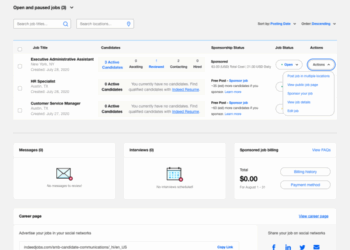
Embark on a journey to discover the secrets of breaking into the tech industry without a formal degree. This guide offers valuable insights and practical tips to help you navigate this competitive field with confidence.
Learn about the essential strategies, tools, and resources needed to succeed in the tech industry without a degree.
Research and Self-Education
In the tech industry, continuous learning is crucial for staying relevant and competitive. With the rapid pace of technological advancements, self-education plays a vital role in securing a job without a formal degree.
Strategies for Self-Learning
- Utilize online platforms like Coursera, Udemy, and Khan Academy to access courses on programming languages, data science, cybersecurity, and other tech-related topics.
- Join tech communities and forums such as Stack Overflow, GitHub, and Reddit to network with professionals, seek advice, and stay updated on industry trends.
- Engage in hands-on projects and challenges to apply theoretical knowledge and enhance practical skills.
- Attend webinars, workshops, and conferences to gain insights from industry experts and expand your knowledge base.
Importance of Staying Updated with Industry Trends
- Regularly reading tech blogs, following influencers on social media, and subscribing to newsletters can help you stay informed about the latest developments in the tech industry.
- Adapting to new technologies and trends demonstrates your flexibility and willingness to learn, making you a valuable asset to potential employers.
- Being aware of industry trends also allows you to anticipate future skill requirements and proactively upskill to meet the demands of the market.
Resources for Learning Tech Skills Online
- Online coding platforms like Codecademy, FreeCodeCamp, and LeetCode offer interactive lessons and coding challenges to improve your programming skills.
- Websites like LinkedIn Learning, edX, and Pluralsight provide courses on a wide range of tech topics, allowing you to customize your learning path based on your career goals.
- Open-source projects on platforms like GitHub offer opportunities to collaborate with other developers, contribute to real-world projects, and enhance your practical experience.
Building a Portfolio
Building a strong portfolio is crucial when applying for tech jobs, especially without a degree. It serves as tangible proof of your skills and capabilities to potential employers. A well-crafted portfolio can significantly boost your chances of landing a job in the tech industry.
The Significance of a Portfolio
A tech portfolio showcases your projects, skills, and accomplishments in a way that a resume alone cannot. It provides concrete evidence of your abilities and allows recruiters to see what you are capable of achieving. In the absence of a formal degree, a portfolio becomes even more essential as it demonstrates your practical knowledge and expertise.
- Include a variety of projects that highlight different skills and technologies you are proficient in.
- Showcase both personal projects and any relevant work experience you have, even if it's freelance or volunteer work.
- Demonstrate your problem-solving abilities and creativity through the projects you choose to include.
- Keep your portfolio up to date with your latest work and skills to reflect your continuous learning and growth.
Creating an Impressive Tech Portfolio
When creating your tech portfolio, focus on quality over quantity. Choose projects that are relevant to the type of job you are applying for and highlight your strengths and expertise. Here are some tips for crafting an impressive portfolio:
- Start by selecting your best work that showcases a range of skills and technologies.
- Provide detailed descriptions of each project, including the problem you were solving, the technologies used, and your role in the project.
- Include code samples, wireframes, design mockups, and any other relevant materials to give recruiters a comprehensive view of your work.
- Showcase your ability to work on a team by highlighting collaborative projects and your role in achieving project goals.
Enhancing Your Portfolio with Personal Projects
Personal projects are a great way to enhance your tech portfolio and demonstrate your passion for technology. They allow you to explore new technologies, work on real-world problems, and showcase your creativity. Including personal projects in your portfolio can set you apart from other candidates and give recruiters insight into your unique skills and interests.
- Choose personal projects that align with your career goals and demonstrate your technical abilities.
- Document your personal projects thoroughly, including the problem you were solving, your approach, and the outcomes.
- Highlight any challenges you encountered during the project and how you overcame them, showcasing your problem-solving skills.
- Regularly update your portfolio with new personal projects to demonstrate your continuous learning and growth in the tech industry.
Networking
Networking plays a crucial role in the tech industry as it allows professionals to connect, collaborate, and stay updated on industry trends. Building a strong network can open doors to job opportunities, mentorship, and valuable insights.
The Importance of Networking
- Networking helps you build relationships with industry professionals who can provide guidance and support in your career.
- It allows you to stay informed about job openings, industry events, and emerging technologies.
- Networking can lead to referrals for job opportunities that may not be publicly advertised
.
Tips for Networking Without a Degree
- Attend industry events, meetups, and conferences to meet professionals in the tech industry.
- Join online communities and forums related to your field of interest to connect with like-minded individuals.
- Utilize social media platforms like LinkedIn to showcase your skills, connect with industry professionals, and participate in relevant discussions.
- Offer to help others in your network by sharing your knowledge and expertise, as this can lead to valuable connections.
Using Online Platforms for Networking
- LinkedIn: Create a professional profile highlighting your skills, projects, and experiences. Connect with professionals in the tech industry and engage with their content.
- GitHub: Share your coding projects on GitHub to demonstrate your skills to potential employers and connect with other developers.
- Tech Forums: Participate in online tech forums like Stack Overflow or Reddit to seek advice, share knowledge, and expand your network.
Certifications and Bootcamps
Certifications and bootcamps are valuable alternatives for individuals looking to enter the tech industry without a traditional degree. They provide specialized training and hands-on experience that can help you develop the skills needed to succeed in various tech roles.
Value of Certifications
Certifications are industry-recognized credentials that validate your expertise in a specific technology or skill. They can demonstrate your dedication to continuous learning and mastery of relevant tools and technologies. Employers often value certifications as they indicate a certain level of proficiency and commitment to professional development.
- Obtaining certifications can help you stand out in a competitive job market.
- Certifications can fill the gap left by the absence of a degree, showcasing your knowledge and skills to potential employers.
- Some certifications are tailored to specific job roles or industries, making them highly relevant and beneficial for career advancement.
Reputable Tech Bootcamps
Tech bootcamps are intensive, short-term training programs that focus on practical skills and real-world projects. They are designed to equip participants with the necessary skills to launch a career in tech. While there are many bootcamps available, it's essential to choose a reputable one with a proven track record of success.
- Some well-known tech bootcamps include General Assembly, Flatiron School, and Le Wagon.
- Bootcamps often offer career support services, such as resume reviews, mock interviews, and job placement assistance.
- Research the curriculum, instructors, and outcomes of different bootcamps to find the best fit for your career goals.
Tips for Choosing Certifications or Bootcamps
When considering certifications or bootcamps, it's crucial to assess your goals, budget, and learning style to make an informed decision that aligns with your career aspirations.
- Research the industry demand for specific certifications or skills to ensure you invest in relevant credentials.
- Consider the reputation and accreditation of the certification provider or bootcamp to guarantee quality education and recognition in the industry.
- Seek feedback from alumni or professionals who have completed the certification or bootcamp to gain insights into their experiences and outcomes.
- Compare the cost, curriculum, duration, and outcomes of different programs to find the best value for your investment.
Internships and Freelancing
Internships and freelancing can be valuable avenues for gaining experience and building a career in the tech industry.
Benefits of Internships
Internships provide hands-on experience, exposure to real-world projects, and the opportunity to learn from seasoned professionals in the field. They can also help you build a network of contacts and references for future job opportunities.
- Gain practical skills and knowledge
- Enhance your resume with relevant experience
- Explore different areas within the tech industry
- Potential for a full-time job offer after completion
Finding Tech Internships without a Degree
To find tech internships without a degree, consider reaching out directly to companies, networking at industry events, and utilizing online job boards and internship platforms. Highlight your relevant skills, projects, and passion for technology in your applications to stand out to potential employers.
- Attend career fairs and tech events to network
- Utilize online platforms like LinkedIn and Glassdoor
- Customize your resume and cover letter for each application
- Showcase your portfolio of projects and skills
Freelancing for Building a Tech Career
Freelancing in the tech industry can help you gain experience, build a portfolio of work, and develop valuable skills while working on various projects for clients. It allows you to work on diverse projects, set your own schedule, and potentially earn a competitive income.
- Build a strong online presence and portfolio
- Seek out freelance opportunities on job boards and platforms
- Communicate effectively with clients and deliver high-quality work
- Continuously learn and adapt to new technologies and trends
Concluding Remark
In conclusion, by leveraging self-education, building a strong portfolio, networking effectively, considering certifications and bootcamps, and exploring internships and freelancing opportunities, you can pave your way to a rewarding tech career without a traditional degree. Stay motivated, stay curious, and embrace the endless possibilities that the tech industry has to offer.
Commonly Asked Questions
How important is self-learning in the tech industry?
Self-learning is crucial in the tech industry as it allows individuals to keep up with the rapidly evolving trends and technologies. It also demonstrates initiative and a proactive approach to skill development.
Why is networking important for landing a tech job without a degree?
Networking is vital as it helps you connect with industry professionals, discover job opportunities, and gain insights into the tech sector. It can compensate for the lack of a formal degree by showcasing your skills and passion directly to potential employers.
Are online platforms effective for networking in the tech industry?
Yes, online platforms like LinkedIn, GitHub, and tech forums are valuable tools for networking in the tech industry. They allow you to interact with professionals, join communities, and showcase your projects and skills to a global audience.
How can personal projects enhance a tech portfolio?
Personal projects demonstrate your practical skills, creativity, and passion for technology. They provide tangible evidence of your capabilities to prospective employers and set you apart from other candidates.
What are the benefits of pursuing certifications in the tech field?
Certifications validate your skills and knowledge in specific tech areas, making you more marketable to employers. They serve as a credible proof of your expertise and can open doors to new career opportunities.
 Embark on a journey to discover the secrets of breaking into the tech industry without a formal degree. This guide offers valuable insights and practical tips to help you navigate this competitive field with confidence.
Learn about the essential strategies, tools, and resources needed to succeed in the tech industry without a degree.
Embark on a journey to discover the secrets of breaking into the tech industry without a formal degree. This guide offers valuable insights and practical tips to help you navigate this competitive field with confidence.
Learn about the essential strategies, tools, and resources needed to succeed in the tech industry without a degree.










